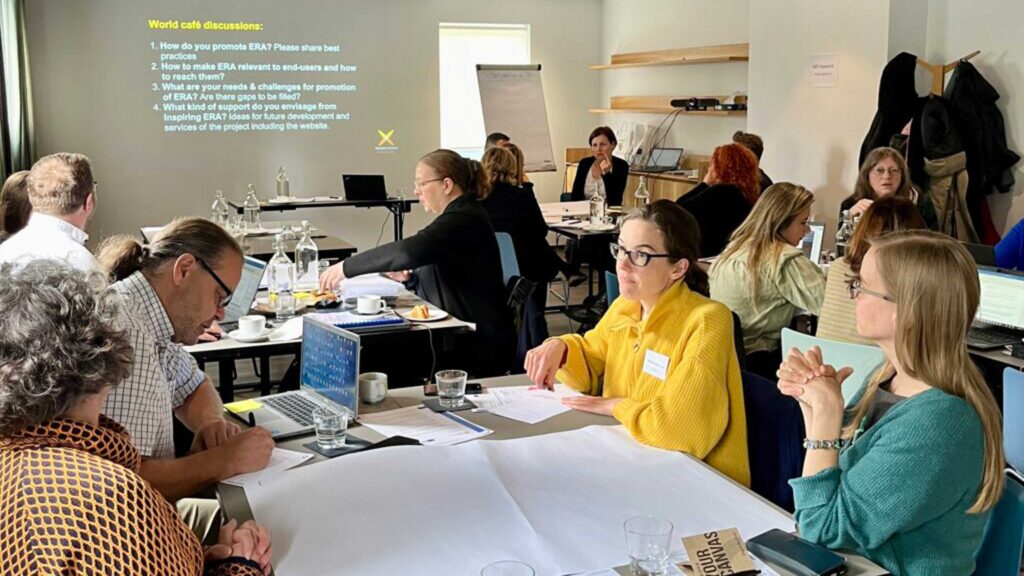WIDERA National Contact Points for Horizon Europe learned more about ERA and public engagement in the EU.

The network of National Contact Points (NCPs) for the EU Horizon Europe WIDERA programme gathered in Reykjavik, Iceland, on 23-24 May for a workshop on the European Research Area (ERA). The overall objective was to foster collaboration between the NCPs and strengthen their interaction with the European Commission on ERA policies and related topics. The workshop included training on impact pathways in Horizon Europe and discussions on enhancing public engagement in the ERA.
To kick start discussions on the role of the European Research Area, the 25 participants from 19 EU Member States and Associated Countries were asked “What is ERA to you?” to harvest their general knowledge of the initiative. The WIDERA NCPs came up with the following:
- ERA aims to foster a cohesive and collaborative environment for research and innovation (R&I) across Europe.
- ERA seeks to implement common policies that unify R&I efforts, creating a platform for cooperation among various actors, including institutions and researchers. This common ground enables the free movement and exchange of knowledge, supports scientific mobility, and aligns policies across the continent.
- By establishing a single market for research, ERA strives to enhance the R&I ecosystem, making it possible for Europe to lead globally in these fields. It is seen as a framework that not only promotes scientific cooperation and innovation but also continues the legacy of Science with and for Society (Swafs), despite its smaller budget within WIDERA.
- Ultimately, ERA represents a broad space for development, aiming to embed European R&I practices and drive progress through shared values and goals.
The WIDERA NCPs were then given an overall historical background and presentation about the status of the European Research Area and the 20 Actions within the current ERA Policy Agenda by Ioannis Sagias, Deputy Head of Unit, DG RTD, European Commission). He continued by presenting the ERA Policy Agenda Action 7 which aims to upgrade EU guidance for better knowledge valorisation i.e. the process of creating social and economic value from knowledge by linking different areas and sectors and transforming data and research results into sustainable products, services and solutions that benefit society in terms of economic prosperity, environmental benefits, progress and better policymaking. The action has recently published a new Code of Practice on citizen engagement for knowledge valorisation. This new Code of Practice was adopted by the EC on 1 March 2024 and will serve as hands-on guide for research and innovation actors on how to build and manage sustainable public engagement to better design and implement innovative, knowledge-based solutions in society.
Maria Hagardt, International Relations Manager at Public & Science Sweden, then presented the first outputs and activities of the ongoing Mutual Learning Exercise (MLE) on Public Engagement which is a part of ERA Action 14 – Bring Science Closer to Society. The main objective of the MLE is to enhance mutual learning amongst participants, to harvest best practices on activities as well as on national policies, and to come up with a set of EU recommendations on how to implement public engagement policies in the ERA. The National Contact Points were then invited to share best practices on public engagement activities and policy initiatives from their respective countries.
The WIDERA NCPs also had the opportunity to get to know more about the new INSPIRING ERA EU project which has been set up to raise awareness about and to promote the successful implementation of the ERA Policy Agenda and the ERA Actions. The project will also facilitate knowledge sharing and uptake between the ERA Forum discussions and the EU Policy platform and share findings and insights from the ERA Actions with the R&I community i.e. researchers, research funding organisations, higher education establishments, civil society, policy experts and more. The project will also facilitate and foster mutual learning, cooperation and the exchange of best practices and lessons learned within the larger ERA community. The NCPs were asked to provide input to the services of the INSPIRING ERA project from their perspective as intermediaries to help inform future project activities. All EU R&I actors are invited to join the INSPIRING ERA community and participate in the project’s forthcoming knowledge exchanges and online information events.
During a world café discussion, the NCPs were asked to provide input on how they promote ERA to their clients and how to make it relevant to them. The discussion also included ideas for further services from the INSPIRING ERA project to help NCPs promote the actions to their stakeholders.
The participants were also given an outline with suggested actions of the next ERA Policy Agenda for 2025-2027 by Anna Seip, Policy Officer, Unit for Spreading Excellence and Research Careers, European Commission. The more than 20 proposed Actions will be discussed at a forthcoming ERA Forum meeting in June. More information on the current ERA Policy Agenda can be found on the European Policy Platform.
The seminar on ERA was arranged by the NCP WIDERA-net and hosted by Audur Rán Þorgeirsdóttir, Senior Adviser in the international team of the Research and Innovation Division at RANNIS, the Icelandic Centre for Research.
